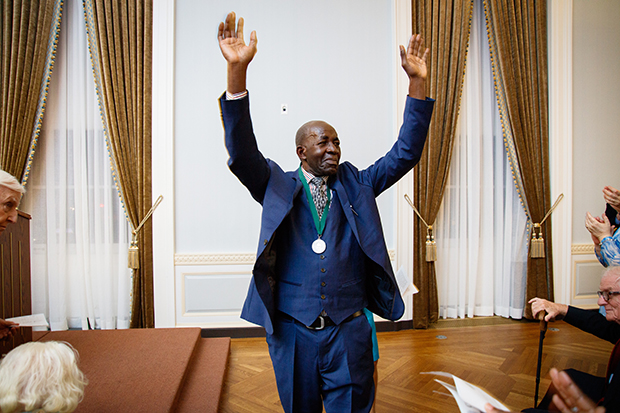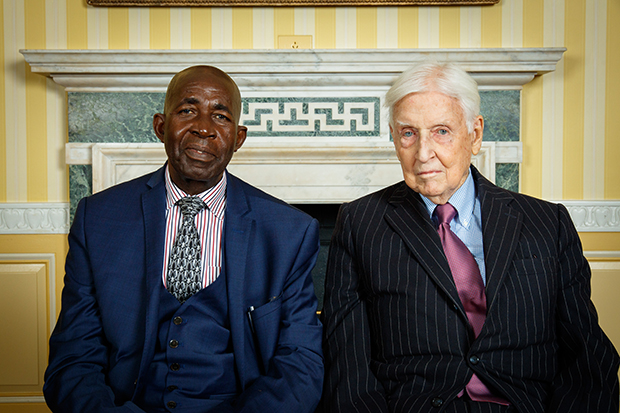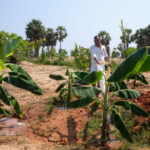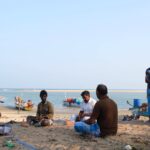This article was published more than 7 years ago.

“Denouncing injustice and cases of grave human rights violations has always been our [organization’s] primary focus. The price I have paid for this work has been 140 days in prison…and an attempt on my life.”
-Pierre Claver Mbonimpa
For most people, surviving a gunshot to the head, losing both your son and son-in-law to brutal murders, and being forced to flee your homeland would be grounds for giving up.
But Pierre Claver Mbonimpa isn’t most people. He’s a fierce and fearless activist who won’t let the threat of violence stop him from defending the rights of the most vulnerable in Burundi—a central African nation that has been mired in a bloody political and human rights crisis since 2015.
“Pierre Claver is one of those extraordinary activists who holds the line between justice and impunity, freedom and authoritarianism, nonviolence and bloodshed, even when it costs him his health, his safety—and tragically, his loved ones,” says Tony Tate, head of the Sub-Saharan Africa program at The Fund for Global Human Rights.
It’s this tenacity that caught Tony’s attention, and in 2011 the Fund began supporting Pierre Claver’s organization, the Association for the Protection of Human Rights and Detained Persons (APRODH). More recently, it led the Train Foundation to award Pierre Claver their 2017 Civil Courage Prize—the latest in a string of prestigious awards that underscore what millions of Burundians already know: that Pierre Claver Mbonimpa is one of the bravest, strongest, and most principled human rights heroes of our time.
Awakening of an Activist
Pierre Claver’s human rights career began in a seemingly unlikely place: prison. While working as a police officer in 1994, he was wrongfully imprisoned for illegal possession of a firearm. Though many believed his arrest was politically motivated, he was ultimately processed and booked at a prison in Bujumbura, Burundi’s capital.
During his two years behind bars, Pierre Claver was beaten, starved, and bore witness to the torture and mistreatment of other inmates. Seeking to curb these abuses, he began studying law so he could assist his peers with their cases. He also joined two other prisoners to form a prisoners’ rights association—a seed from which APRODH would grow.
In 1996, Pierre Claver walked out of prison a free man; but the trauma he lived through, and the desire to prevent others from experiencing it, stayed with him. Shortly after his release he launched an anti-torture project. Then in 2000, he founded APRODH—a national nonprofit organization dedicated to protecting and defending the rights of not only prisoners, but all Burundians.
The Rise and Targeting of APRODH
Seventeen years later, APRODH has emerged as Burundi’s leading human rights organization. Under Pierre Claver’s leadership, the group is on the frontlines of a range of pressing issues: from escalating attacks on human rights defenders, journalists, and civil society activists; to the prevalence of sexual violence, torture, and unlawful detentions; to the abuses that continue to occur behind Burundian prison walls.
APRODH’s hard-hitting reporting and outspokenness has landed them in the crosshairs of powerful critics—including top-ranking members of the Burundian government. Backlash against the organization escalated in 2013, when APRODH strongly and vocally opposed growing crackdowns on freedoms of speech and assembly. These crackdowns paralleled the lead up to the 2015 elections, when Burundian President Pierre Nkurunziza decided to run for a controversial—and likely unconstitutional—third term. Almost immediately after Nkurunziza announced his candidacy, protests erupted in the streets. Burundian police responded with undue force, indiscriminately shooting demonstrators, scores of whom were killed.
When Nkurunziza was announced as the winner of a disputed election in July 2015, the situation devolved into further bloodshed. According to APRODH, since the ongoing crisis began, thousands have been killed, civil society groups and media outlets critical of the government have been raided or shut down, and 450,000 people have fled the country.
Pierre Claver: Survivor
Among those forced to flee Burundi was Pierre Claver himself. His situation became more perilous in 2014, when he was arbitrarily detained for 140 days for speaking out against human rights abuses linked to a government militia. Then in August 2015, he was shot in the face by a gunman on a motorbike. The assassination attempt occurred shortly after Nkurunziza, who Pierre Claver publicly opposed, announced his win; many claim it was politically-motivated.
Fortunately, at the time of the attacks, Pierre Claver was already widely known and connected to diplomatic and human rights circles. Among the groups who sprung to his defense was The Fund for Global Human Rights. Our uniquely nimble grantmaking strategy enabled us to swiftly channel vital funding to support Pierre Claver’s legal aid, security, and, ultimately, his evacuation to Brussels, where he currently resides. His son and son-in-law were not able to escape the violence, and were murdered within one week of each other in November 2015.
The beloved “grandfather of Burundi’s human rights movement” and his family had suffered unimaginable blows; but Pierre Claver wouldn’t stay down for long. The activist has continued to lead APRODH from his refuge in Brussels. Despite the risks, he hopes to someday rejoin his colleagues, many of whom face daily threats in Burundi.
Accolades for a Human Rights Hero
In recognition of his resilience, Pierre Claver has received a number of human rights awards, including the 2007 Martin Ennals Award and the 2016 Human Rights Watch Alison Des Forges Award. Earlier this month, he was selected by the Train Foundation to receive the 2017 Civil Courage Prize.

At a ceremony in New York on October 18, Pierre Claver accepted the honor, which he said he shares with his fellow activists at APRODH. The United Nations’ top-ranking human rights official, Andrew Gilmour, delivered the keynote speech, and Train Foundation founder, the Honorable John Train, was in attendance and gave remarks. Mr. Train established the Civil Courage Prize in the mid-1980s as a way to honor everyday people who risk life and limb to preserve and protect the basic freedoms and well-being of their fellow citizens—a trait Mr. Train called “civil courage.”
“This is a great gesture of recognition, and an encouragement for me and my fellow human rights defenders to continue to fight with dedication and determination—against all odds—to achieve rule of law in Burundi,” Pierre Claver said in his acceptance speech.
On November 12, Pierre Claver will again be honored at the Rothko Chapel in Houston, Texas, where he will accept the Óscar Romero Award. The Fund is proud to stand with him as he receives these accolades and continues his incredible work; because when an activist exhibits the courage of Pierre Claver, standing with them is the only option.


